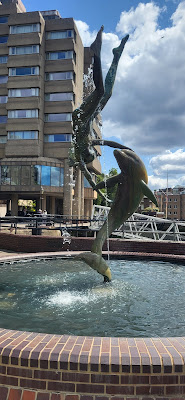"But as it is, they desire a better country, that is, a heavenly one." (Heb 11:16a)
Here's an odd thing. Or several odd things. Those people who dislike people of other religions or nationalities than themselves. They quite often call themselves "Christian". Or "Cultural Christians". Or "Judeo-Christian" has become quite popular these days. But they criticise other people - people originating from other countries, or of different colours, or, quite often, Muslims - by saying they don't have their primary allegiance to this country.
Norman Tebbit recently died. He showed remarkable resilience and courage when his wife was terribly injured in the 1984 attack on the Grand Hotel in Brighton. But, being a man of snappy phrases, he's probably mostly remembered for his comment that those who needed work should get on their bikes, and also for his "cricket test". He said if people didn't support England at cricket, they weren't sufficiently British. I think there are probably Scottish people who wouldn't think much of that, quite apart from anything else.
Many years later, he said the "cricket test" wasn't needed any more. But still it sticks. What happens if we apply it to Heaven?
Imagine a field. In the mid to late 1st Century. Somewhere in the Celtic town, now colonised by the Romans, of Londinium. A field called "Dominorum". A Brythonic warrior is bowling the head of a fallen enemy at a doughty native of Lactodorum, from the not-yet-county of Northamptonshire. And, in a scene that will recur for the next two millennia, the Northants team's middle order collapses. If the Cockney Celt bowler hits the stumps three times in succession, he gets a hat to put on the head of his "ball" when he gets home. But we have no idea what they called it when that happened.
But the author to the Hebrews had never heard of cricket. He was a long way from that far-off patch of Empire. The idea of rain stopping play - rain generally being a blessing in the Med - would not hold the terror (or, at least, mild frustration) it does on the western fringes of the Eurasian continent.
But still, he (or she) spelt it out. If there was a game of cricket between England and Heaven - and why not, because in Heaven "all in white shall wait around" - then English Christians should be supporting Heaven. They have another country. Another city. (Obviously, if England did play Heaven at cricket, King David would constantly be no-balled for slinging.)
Abram set out from Ur. But if we consider Abram's faith in the light of what it says in Genesis - he's not the faith super-hero he often gets depicted as. He hasn't boldly gone into the unknown on his own, leaving his birthplace. He actually left with his dad, who took him from Ur to Harran. Abram only left Harran under his own steam. But Abram carried on and became the example of the faithful of all times, because he was heading for the New Jerusalem.
Not the Jerusalem of the time. That was ruled by a Jebusite priest-king called Melchizedek, and was actually just three cottages and an outside loo. And not even the Jerusalem that David built, or that Herod re-embellished with a new Temple it didn't actually need. All those Jerusalems were provisional, temporary. And certainly not the current one, which rains down death from the skies on its enemies. That one, too, will pass.
Abram was looking for a new Jerusalem. A place of peace where there is no war, no sickness, and the presence of God is as real as it was in the dark when the torch passed through his sacrifice in the Valley of Shaveh. His heavenly Father's home. Not Ur, the place where his earthly parents came from. Not Harran, where his earthly father had remained. He roamed across the known world. He was a stranger in the land he was promised. But he did it because he was looking for somewhere else. He wasn't a citizen of Ur, of Harran, or even of his Promised Land. He was a citizen of Somewhere Else.
And that's who you are, when you become a follower of the God of Abraham. You are a citizen of Somewhere Else. A country whose priorities aren't defence and immigration and building new railways - but peace and love for everybody. You can give thanks for this world. Care for it and all the people made in God's image. Work to make it a better place. But you know it's temporary. You are a citizen of Somewhere Else. You want to be home - in the place where the God who made you knows you. You want to be with him, and like him. And that longing to be with God, and that knowing you belong somewhere else - that you are called for more, because Jesus came to find you, and meets you in his death- that's faith.
You are a citizen of Somewhere Else.




